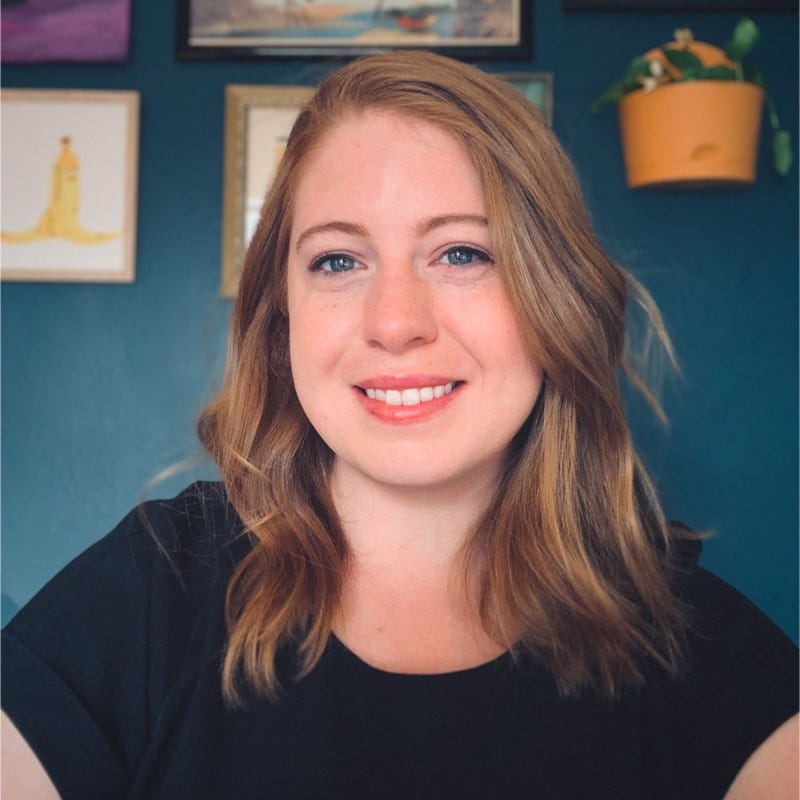Kate Lindsay’s Atlantic piece about Gen Z parodies of millennial TikTok made me ask how early career professionals can deal with all the cringe in an intergenerational workplace.
Two millennials join the Mode/Switch to advise: Bethany Keeley-Jonker is a mom of one and a comm prof for many, and Rachel Hennessy is a marketing content manager and, as you may have noticed, a repeat personality on the Mode/Switch.
Neither sighs heavily at the start of their TikToks.
Bethany: The very first, I think, sighted location of this “millennial pause” was someone pointing out that Taylor Swift does it. And I think she's really hip. Maybe that also makes me old.
But it also has me thinking, Ohh no, I do something that an incredibly savvy pop star does? OK.
Rachel: I heard about this ‘millennial pause’ through TikTok—and I was like, Ohh no, another thing to be ashamed of. There was a time we were all against the boomers and that felt very unifying—and we've all got a common enemy which, I have said time and time again, is usually what unites people, not loving something. Hate—now there is a unifying force.
Craig: Are these millennial online tics anything but funny? What does this conversation say about the workplace today?
Bethany: I think a lot of millennials in their first jobs--that was sort of your work identity: “I'm the hip young one.” So, to suddenly be neither hip nor young means we have to figure out who we are. Again.
Bethany Keeley-Jonker
Rachel: All I do all day at work is blog because that's what my business wants me to do and that's what other businesses run by other people in my age group are looking for. Blogging is still really big, but I know it's for SEO, and I know it gets lots of content on a website. But eventually, no one’s going to be reading them.
Bethany: Gen Z think of blogs like I think of e-mail. It's the thing for work, not a thing for fun.
Rachel: One thing that has come out of this conversation around generational differences online is even more nuanced takes from Black creators, which opened up my eyes to how White some of this conversation is.
Bethany: It's always been the case that communities build their own ways of speaking and shorthands for stuff, and that those change over time. I think it's also often been the case that youth culture in the United States cribs stuff from Black culture. But what's new from social media is that Black people and Black scholars are more able to point out that this is what's happening.
Craig: That feels super important for consuming content across intergenerational and interethnic lines. But what’s one rule that guides your content creation, especially when you’re working across those cultural lines?
Bethany: It's not always the goal to be hip.
Rachel: Yes, yes! We don't want any medical journals referencing the abomination that is Health Talks on TikTok. I try to avoid it. It seems like there's a lot of sketchy advice going on over there. I just wanna learn about home settings and a van life from a distance.
Rachel Hennessy
Bethany: So, Rachel, I think that you and I have a similar approach to life, in general—that is, to lean into humor and self-deprecation. How do you navigate that as a communication professional, where you don't wanna undermine yourself but—
Rachel: This is a good question. How do I--? The pandemic gave me, gave everybody, a lot of time to look inward. Who am I as a person? What are my breaking points? What will I stand for? What will I absolutely not stand for anymore? Had I been steadily employed during the pandemic and face-to-face all the time with people, I think it could have been very easy for me to follow in the footsteps of somebody else. Instead, I got that moment to say, Alright, this is who I'd like to be. Umm, so I see couple gaps in the performance in these areas. Should probably shore those up.
But I would ask it back to you. How is that going?
Bethany: I've been thinking about a conversation I had with a Black trans student earlier this year—checking in with her about how things were going. It's sort of like half-joking, half-very- serious: Listen, I'm a middle-aged White mom. We yell at people. If you need me to yell at somebody for you…. And she chuckled. But it taught me I don't need to be the same as you. In fact, it's to all of our benefit for me to be different from you.
Rachel: I also would like to say that even though Gen Z is known as a more racially aware, they can, you know, bully a lot faster. Because they know all of these tools. But that's part of the same conversation. I think there's a lot to be said for what's happening intergenerationally: take all the experience that Gen Z has in and amongst themselves and have millennials and Gen X and boomers there to guide and set up good standards.
Craig: I was listening to a conversation earlier this week between Ezra Klein and Kathryn Bond Stockton, about working with very nice people. That niceness is easy to make fun of. But as a rather lefty academic, Stockton found that niceness could be a good place to start important conversations. And so, when you talk about boomers as a guide, Rachel, that's what I think of. Oldster values like being nice no matter what can be good starting points for going places that might otherwise be hard to get to—as opposed to an MO of being mean as fast as you can.
Bethany: I do wanna note that an accurate description can be affectionate as well.
When a young person says, You old people act like this, it feels like an insult, but I don't know that it's always meant that way, right? I will never forget my kid, when she was three, just kind of out of nowhere, saying, I have to do my work. My work is typing on a computer. Boop-boop-boop-boop. OK. Alright. I'm closing the door to this office from now on.
Craig: Well, thanks, you two. Earlier, you said, Rachel, that the thing humans are awesome at online is hate. But in this conversation, you two have been showing what love might look like, too.
[This interview has been edited for the sake of clarity and brevity.]
Who I’m Learning From
If you’re looking, as one does, for a way to blow a morning on a wormhole, check out this parody of millennial videos, imaged above on the top left. Your algorithms will take it from there.
The second image on the top right is John J. Custer’s graphic for the Kate Lindsay Atlantic piece discussed in this week’s issue of the Mode/Switch and entitled, “Are You Sure You’re Not Guilty of the ‘Millennial Pause’?”
Finally, check out this conversation between Ezra Klein and Professor Kathryn Bond Stockton sorting through (among many things) why it is that being red statey nice can nonetheless be an important moral startingpoint, at least for vital conversations about gender.






